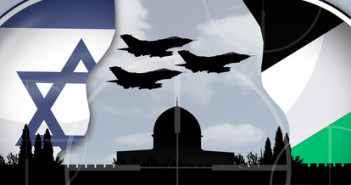In the past year, it was easy to label the Israeli rhetoric about war as a diversion from burning internal affairs, such as social justice protests, tax reliefs for big companies, tax hikes for regular citizens and the issue of drafting ultra-orthodox Jews to the military. However, in the past few days, there are ominous signs that Israel is getting much closer to a strike on Iran.
Is this another bluff? Here are 5 signs that point to higher chances that Israel might be more serious now:
- Prime minister given extended authority: In a fast move that was deemed by many as undemocratic, the Israeli government gave (Aug. 12th) extended decision making powers to PM Benjamin Netanyahu. The first modification of government rules since independence makes it easier to bypass opposition within the government to a strike on Iran.
- Israeli Home Front holds huge drill: A major drill is held this week (Aug. 13-17) to prepare the Israeli home front for the possible counter attack that Iran and / or its allies would launch on Israel.
- Bank of Israel gets ready: Israel highly regarded governor of the central bank, Stanley Fisher, said (Aug. 8) that he is taking steps to prepare the financial system for a possible Israeli strike on Iran.
- France is preparing mass evacuation: France has set up contingency plans for a mass evacuation of French nationals. Hundreds of thousands of Israelis also hold a French passport.
- Media Blitz: While the world is busy with so many economic issues, the debate about a strike in Iran flooded the Israeli media over the weekend, justifying such a move and preparing the public. These seem to be orchestrated by Israel’s defense minister Ehud Barak, who hints that the window of opportunity is closing. This includes the usually left-leaning Haaretz, which reported (Aug. 12) that Iran made progress towards a nuclear bomb. PM Netanyahu declared that Iranian threat “dwarfs” all others. This was the first topic of his opening statement in the weekly government meeting.
Netanyahu and Barak don’t have clear support in the Israeli public. While there’s no doubt that Israel cannot tolerate a nuclear Iran, many feel that an Israeli strike is not the way to go, and that it could be counterproductive. The current and former top military brass is opposed to the war, a
The sanctions imposed by the US and Europe on Iran are weakening the country: oil production is falling and rising prices of food are angering the public. The public outrage, especially regarding the price of chicken, caused Iran’s national police chief Esmail Ahmadi-Moqaddam to call state television not to broadcast films where people eating chicken are seen.
In case violence breaks out, oil prices would surely rise. The implications for currencies would be a stronger dollar and yen, with varying degrees of losses for other currencies. label the Israeli rhetoric about war as a diversion from burning internal affairs.
The peg of the Swiss franc to the euro could break in such an event, as the franc could attract even stronger demand. This is what happened during the Arab Spring.
